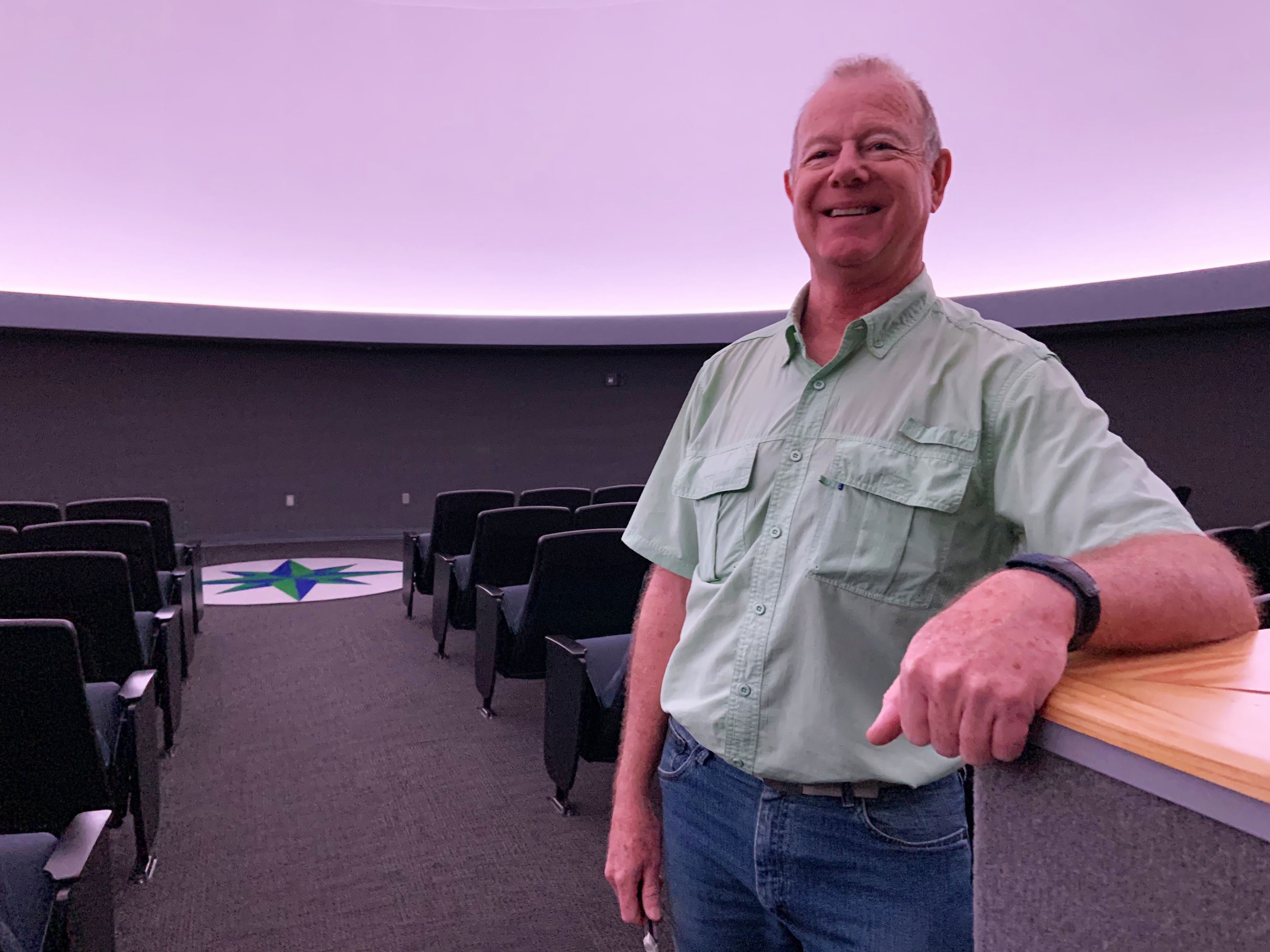Troy Moon, Pensacola State College
What is the best way to spy a planet among all the stars?
Turn off the stars.
Mother Nature can’t do that. But Billy Jackson can. At the Pensacola State College Planetarium and Space Theater, Jackson is the Master of the Firmament.
“We can showcase different constellations, or just turn of the stars to show the planets,’’ said Jackson, PSC Planetarium specialist. “Or I can show the passage of time. We can go forward in time, backwards in time. We can do a lot of amazing things.”
Since 1993, the College’s Planetarium has offered students – and the public – a glimpse into the heavens from images projected on the planetarium’s 40-foot diameter dome. If you remember going to the Planetarium before that ― say the 1960s or 1970s – it was a different planetarium.
“The old planetarium is where the weight room is now,’’ said Jackson, who has been the planetarium specialist for 14 years. “But this one has been here long enough now that I get College students stopping me and saying ‘I remember coming here in first grade. It’s not as big as I remember it.’”
But, Jackson said, that’s only because the children grew up. The planetarium, with just under 100 specifically inclined seats to optimize viewing, is still the same size.
“The children love it,’’ Jackson said. “We get them enthusiastic about space and show them the sky in a way they’re not used to seeing it.”
The planetarium offers shows for groups of 15 people or more. There are 20 different shows available and are designed for certain age groups. The planetarium sees just under 10,000 attendees each year.
Shows include “Back to the Moon for Good,’’ “From Earth to the Universe,’’ “Perfect Little Planet,’’ and “Tales of the Mayan Skies.” But not show is space oriented. The planetarium also offers “Microcosm: The Adventure Within,’’ which explores the human body and its miniature bacterial inhabitants, and “Let It Snow: A Holiday Musical Experience.”
And popular with all age groups is the part of the show where Jackson has the night sky projected so that spectators can see – without the light pollution of society – the sky and its wonders more clearly.
“I tell them a little bit about the College,’’ Jackson said. “Then we do a night sky presentation and I narrate through that live. They learn to locate certain features – Orion and Orion’s Belt, Sirius, and any planets that are visible.
“The children are always excited to be able to go home and try to find one of those features they saw at the planetarium.”
He recalled one letter he received from a teacher where a student who had toured the planetarium had seen “Old Ryan in the sky.’” The student might have got the name a little mixed up. But to be able to find the “Old Ryan” constellation is an achievement for a child.
The planetarium also offers “Dark Side of the Moon,’’ a visual and aural exploration of Pink Floyd’s 1973 landmark album of the same title.
The planetarium recently completed a two-year renovation project that included the repainting of the dome, computerized LED lighting, a state-of-the-art surround sound system, new seating and carpeting, and a streamlined control console.
It is one of the few planetariums in the region, though Pensacola Christian College also has a planetarium. Other than the two colleges, the nearest planetariums are in Tallahassee, Montgomery and New Orleans.
PSC astronomy instructor Lauren Rogers uses the planetarium while lecturing students at the beginning of each term. When she came to PSC three years ago, she was stunned to find that the college had a planetarium.
“It’s just an outstanding feature and learning tool for the students and the community,’’ she said. “It’s really uncommon to have a planetarium like this at any state college. We’re really fortunate.”
She said her students “get to see the night sky as they never really get to see it because of all the light pollution. You shouldn’t and don’t need a telescope to see the night sky. You can see (Mercury, Venus, Mars, Jupiter and Saturn) with the naked eye. But often we don’t get the clearest view because of all the light and obstacles. But in the planetarium, you can view the night skies the way the ancients viewed them.”
She said the planetarium offers a unique chance to educate her students that instructors at other schools just don’t have.
“The students, they just light up,’’ Rogers said. “And Billy Jackson is the best and always does a great job narrating in a way that really interests the students. The whole experience is just really cool.”
Planetarium Page on PSC website: http://www.pensacolastate.edu/community/planetarium/
PHOTO: Billy Jackson, PSC Planetarium specialist. Photo by Mike Suchcicki

 PirateQ
PirateQ 
